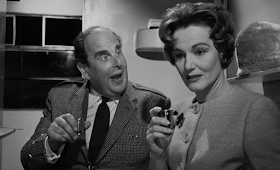This new BFI issue looks pin-perfect and its spirit of Scottish
subversion survives the modest modern approbation its central conceit inevitably
brings. Yes, there are some difficult concepts at play here as ballsy American
businesswoman Angela Barrows (Constance Cummings) attempts to steamroll a male,
grey and stale family tweed makers in Edinburgh, but there’s wit enough to make
sure that the joke’s on both sides and that it’s not just about “sex” but modernisation.
Mrs Barrows may well be a corporate psychopath but her business sense is up
against dinosaurs who source their thread from crofter’s cottages in the Hebrides…
she wants to replace them with a factory and artificial fabric! Och, the very
thought is enough to drive any Scotsman to seek solace in the nearest bottle of
single malt…
Directed by Charles Crichton with a screenplay by Monja
Danischewsky – who helped produce Whisky Galore! (1949) - from a short story
by James Thurber (The Catbird Seat), it’s another film in which Peter
Sellers simply disappears into character. In this case he is Mr Martin, Head
Accountant of McPherson & Co. – who like Harris Tweed, follow very
traditional practice. Sellers was only 34 at the time but you can only see a
middle-aged man of gentle but determined demeanour, a withdrawn Edinburgh
accent and powdery grey hair.
 |
| Peter Sellers |
 |
| Constance Cummings hold the Board Room |
Business may be good but, Angela says to McPherson’s top
salesman, if the tweed sells itself, why does the company need a salesman?
There’s no doubt that the company could do better and yet that’s also a threat
to timid firms the country over and this is almost as universal a conundrum as
the gender conflict.
Old MacPherson has recently passed away and his nephew,
Robert (Robert Morley) lacks the experience and is most certainly not aligned
with the corporate values of his Uncle’s firm. Meeting Angela on the train, he
decides she is the one to bring the business into the Twentieth Century and,
being of naive and English (always a winning combination…) doesn’t grasp that
she will bring too much twist to the cosy comforts of the world of tweed.
There’s much delight to be had in seeing the culture
clash and the alarm of the greying character actors as Angela begins to work
her way – getting them to change their filing systems from one held together by
memory to one based on dates, alphabet and order. She buys them calculating
machines, replacing the fountain pens that in the quiet office before, Mr
Martin could tell if a nib needed replacing by the scratching made on
parchments as the men leaned into their patient transitions.
 |
| Everything in its place... |
Mr Martin takes Angela to the islands to see the “factory”
that produces the yarn and once she realises that it is dozens of “mum and dad”
crofters in cottages across Harris/Lewes then she decides that it would be much
more efficient to build a single factory and then to use man-made fabrics –
nylon!
Things have gone too far and Martin strikes back, at
first in gentle ways, re-routing MacPherson’s new “squawk box” so that he can’t
find where his staff are and then ordering too many clocks – following Angela’s
instructions in the wrongest way possible. He almost starts to win, but his
upset only causes Robert to fall a little further in supportive love. As the situation shifts once more in the favour of new
working practice and “female” efficiency, Martin decides there’s only one way
out and, after taking notes from watching a detective murder mystery film, sets
about planning the perfect murder…
All’s fair in love and war but you’ll have to see it for
yourself to see how the story resolves itself. Whatever happens it’s clear that
Martin is fighting a mere battle in an eternal “war” and with Crichton’s assured
hand on the tiller we are steered through a gentile romp that still gets laughs
through gentle offending everyone.
Morley is brilliant as you’d expect and Cummings gives as
good as she gets but it’s Sellers who catches the eye adding subtlety to what even
the shallowest of depths.
Battle of the Sexes is out on Monday 20th
April and comes with a handsome booklet stuffed with essays and information as
well as excellent extras. Another film I’d not seen from this period and one
much in favour in this era of the Talking Pictures revolution and the BFI’s ongoing
digital redistribution of films before our time.
Extras on the disc:
Hancock’s Hard Boiled Eggs: Sellers’ contemporary, the Lad
from East Cheam himself, Tony Hancock, appears with The Battle of the Sexes’
Patricia Hayes in this cracking collection of 11 egg-cellent Egg Marketing
Board adverts from 1966
A Ghost of a Chance (1968, 50 mins): bonus feature-length
fun for all the family as Sellers’ chum Graham Stark stars with Ronnie Barker,
Patricia Hayes, Jimmy Edwards, Bernard Cribbins and Terry Scott in a corking
Children’s Film Foundation comedy
Images of Edinburgh in Archive Film: an atmospheric
selection of rarely-seen short films capturing Scotland’s capital in the first
half of the 20th century, from the vaults of the BFI National Archive
Woolly Wonders:
evocative 1940s archive films of traditional Scottish clothmaking, shot in
colour by the great Jack Cardiff
Image gallery
Plus 30 page booklet including an essay by Vic Pratt, The Complete Man: Peter Sellers and the Battle of the Sexes along with biographies on the main players from Kieron McCormack.
Another excellent package, buy with confidence from the BFI online shop!











Hard to get back into black and white film, but this may be worth it.
ReplyDeletehttps://aab-edu.net/
I enjoyed reeading this
ReplyDelete